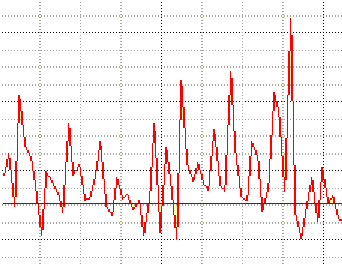

 The
Psychopath's Brain
The
Psychopath's BrainRenato M.E. Sabbatini, PhD
[Back to the first page]
A lot of the personality characteristics of sociopaths could be explained by emotional deficits. For example, they have little affect for others, are incapable of love, do not get nervous easily and show no remorse or shame when they abuse other persons. Therefore, scientists have long been hypothesizing that psychopaths have a deficiency in their reactions to fear-evoking stimuli, and this is the cause of their insensitivity and also of their inability to learn from experience.
Many experiments with sociopathic individuals have suggested that this is true. One of this experiments put criminal offenders with high levels of sociopathic personality disorder viewing projected slides of pictures with different emotional contents. During the viewing, they were startled with sudden, unexpected noises. In normal persons, when they are watching pleasant pictures, the startle response (an eyeblink) is of lower magnitude than when the pictures show unpleasant and stressful images (depicting aggression, blood, horror, etc.). Neutral pictures have a startle response in between those of pleasant and unpleasant pictures. What happened with criminal sociopaths ? They have exactly the opposite pattern: they blink less the eyes in response to the startling noise when they are watching stressful pictures ! However, only the sociopaths who had traits of emotional dettachment showed this phenomenon. This could be explained by a lack of emotional reactivity in these offenders.
In another experiment, scientists recorded the physiological responses of sociopathic criminal offenders when viewing stressful pictures, or when processing words with high emotional contents. The recorded physiological parameters are the same which are used with "lie detectors":

Psychopaths show almost no alteration in these parameters when they are subjected to stress or unpleasant pictures. They also do not appear when the subjects are forewarned by a flashing light when they are going to receive a stressful stimulus (for example, a disagreeble puff of air on their faces). This is the reason why sociopaths are so good liars and why they are not detected by standard lie detection equipment.
However, all this doesn't mean that sociopaths do not have emotions. They have, but in relation to themselves, not in relation to others. In fact, such individuals are unable to feel "social" emotions such as sympathy, empathy, gratitude, etc. This may explain why sociopaths are so willing to inflict suffering and pain onto other people without so much of a blink or remorse. For them, the emotions of other people have no meaning at all; they "are unable to construct and emotional facsimile of others."
What kinds of emotions do sociopaths have ? They are quick to become angry, are aggressive, irritable, and are very sensitive to shame or humiliation. They are also get pleasure by means of dominance and are exhilarated by this. .
 Antonio
Damasio, a Portuguese-American neurologist, already cited by us in
the introduction, has a theory which could explain why patients with disorders
provoked by lesions in the ventromedial frontal brain (and, by extension,
sociopaths) have this emotional problems. He has named it "the
somatic marker hypothesis", and
it runs in the following way:
Antonio
Damasio, a Portuguese-American neurologist, already cited by us in
the introduction, has a theory which could explain why patients with disorders
provoked by lesions in the ventromedial frontal brain (and, by extension,
sociopaths) have this emotional problems. He has named it "the
somatic marker hypothesis", and
it runs in the following way:
Normal individuals activate somatic states (changes in heart rate and respiration, dilatation of pupils, sweating, facial expressions, etc.) in response to punishment associated to social situations. For instance, a child breaks something valuable up and is punished severely by his parents, evoking these somatic states. The next time a similar situation arises, the somatic markers are activated and the same emotion associated to punishment is felt. In order to avoid this, the child suppresses the undesired behavior.
According to Damasio, persons with frontal lobe damage are unable to activate these somatic markers. He says: "this would deprive the individual of an automatic device to signal ultimately deleterious consequences relative to responses that might nevertheless bring immediate reward". This explains also why sociopaths and patients with pre-frontal lobe damage show little autonomic responses to socially-conditioned words and pictures with emotional contents, but have normal responses to unconditional stimuli, as another of Dr. Damasio's researches has shown.
Thus, by analyzing sociopathic behavior and its causes, Damasio points out in his bestseller book, "Descartes' Error: : Emotion, Reason and the Human Brain" that reason and emotion are not separated and antagonistic (this is the error committed by French philosopher René Descartes. alluded to in the book's title), but rather that one is important to the other. Individuals who are intelligent and who are able to reason well, become social monsters when they do not feel the "social emotion", which is the basis of morals, of feeling what is right or wrong, etc.
Copyright 1998 Universidade
Estadual de Campinas
Brain & Mind Magazine, Campinas,
Brazil
Renato M.E. Sabbatini. PhD
Center for Biomedical Informatics